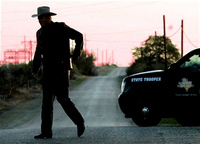Government agencies find hands tied by shoestring
May 29, 2008
These are real shortages, not the whining of empire-building executives. Often the problem isn’t that the Legislature didn’t authorize enough positions but that the pay is too low to attract or keep a guard, a caseworker, a trooper.
Written by The Editorial Board, Austin American-Statesman

A new report from the staff of the Texas Sunset Advisory Commission warns that the state’s Department of Public Safety “is facing a critical personnel shortage, weakening its ability to protect the public.” The problem isn’t that the Legislature doesn’t allow DPS to hire more troopers, but that the agency cannot hire and keep enough troopers to fill the authorized slots.
If this problem sounds familiar, that’s because it is - throughout state government today. To give just a few examples:
— The state’s Health and Human Services Commission fell badly behind last year in hiring and keeping enough qualified workers to handle applicants - about 3.7 million people - for food stamps and Medicaid services. Employee turnover was high, and that turnover cost taxpayers, because not only is the former employee’s experience and efficiency lost, but a new employee has to be trained. A commission spokeswoman this week reported “a dramatic reduction in our turnover” after a way was found to boost pay and speed up raises.
— The Department of Family and Protective Services has had high turnover of caseworkers in its Child Protective Services division. The agency was fined $4 million by the federal government this year for not checking on the 17,000 foster children in its care often enough, though the state is appealing. About one-third of the caseworkers left state employment last year, mostly because of a heavy workload and low pay, according to the state auditor.
— The Texas Department of Corrections was short 3,481 guards as of April 30, 13 percent of its authorized guard force of 26,356. In March, the agency adjusted its pay scale to help alleviate the shortage, raising the pay for starting guards from $23,046 to $25,416 and moving up pay raises for others. In addition, it began awarding $1,500 bonuses to guards who would agree to spend at least a year at state prisons with particularly severe understaffing. In March, the prison system’s executive director, Brad Livingston, said the shortage of guards was “the most critical issue we face.”
These are real shortages, not the whining of empire-building executives. Often the problem isn’t that the Legislature didn’t authorize enough positions but that the pay is too low to attract or keep a guard, a caseworker, a trooper.
Employee shortages can be dangerous, not just inconvenient. Prison guards might be more easily overcome, harmed or killed by inmates in a disturbance. A shortage of troopers could mean a longer wait for back-up during a nighttime highway stop, or for help at an accident.
The Sunset commission staff said DPS has problems hiring enough troopers not only because of “higher-paying jobs in the private sector” but negative publicity about racial profiling and excessive use of force, as well as the increased demand for government security employees - Border Patrol, for example .
The report also suggests that DPS could make more efficient use of the troopers it has.
Still, the pattern across state government strongly suggests that when lawmakers convene in January, higher pay for such frontline service jobs as trooper, prison guard and human services case worker must get serious attention - and money.![]()
![]()
Related Stories
![]()
Fair Use Notice
This site contains copyrighted material the use of which has not always been specifically authorized by the copyright owner. We are making such material available in our efforts to advance understanding of environmental, political, human rights, economic, democracy, scientific, and social justice issues, etc. We believe this constitutes a "fair use" of any such copyrighted material as provided for in section 107 of the US Copyright Law. In accordance with Title 17 U.S.C. Section 107, the material on this site is distributed without profit to those who have expressed a prior interest in receiving the included information for research and educational purposes. For more information go to: http://www.law.cornell.edu/uscode/17/107.shtml. If you wish to use copyrighted material from this site for purposes of your own that go beyond "fair use", you must obtain permission from the copyright owner.